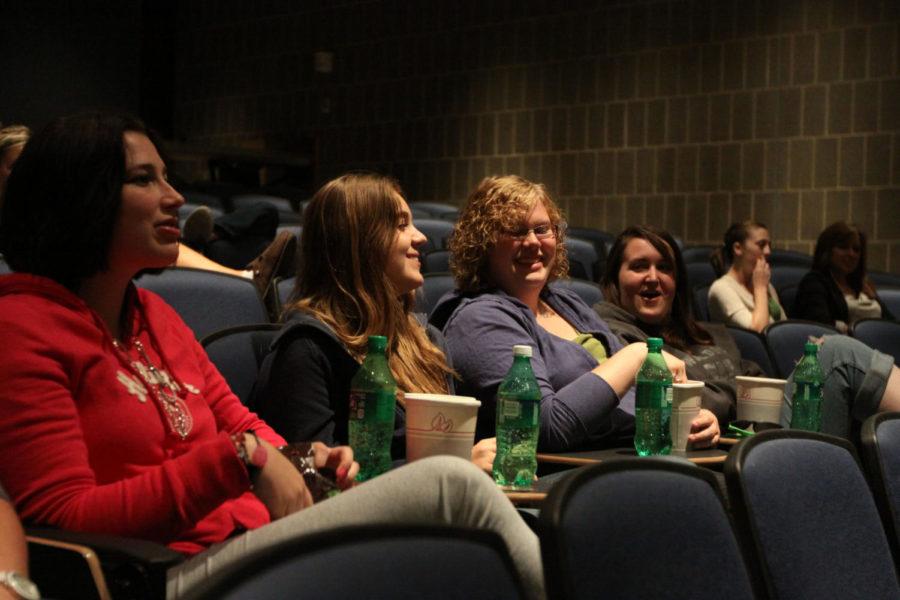Iowa State GSB members push resolution to provide closed captions, subtitles for lectures, Cyclone Cinema
Photo: Huiling Wu/Iowa State Daily
Destiny Taylor, freshman in animal science, left, Richelle Fermanich, freshman in pre-business, Tessa Flak, open-option freshman, and Megan Eisenmann, freshman in psychology, watch free movies Thursday at Carver Hall. Cyclone Cinema provides free movies every week, which attract many students’ interests.
November 4, 2014
A simple change will make diverse groups of students more engaged on campus.
Danielle Nygard, senator for the Government of the Student Body, and Presha Kardile, chair of the diversity committee, have been working on a resolution that will see closed captions and subtitles added to lectures at the Memorial Union and Cyclone Cinema, an event that showcases a preselected movie every week Thursdays through Sundays.
Nygard, sophomore in political science, said she believes adding closed captions and subtitles will benefit different groups of students on campus.
“This will help not only the deaf or hard-of-hearing students on campus but also international students who are still working on learning English,” she said.
Nygard said she also believes the changes can benefit students in the room who aren’t in need of the accommodation or who aren’t international students.
“If it is something that is just audio, then it may help make sure they get all of the wording that is there so they’re not missing anything,” Nygard said.
Nygard thought of the idea while she was in her American Sign Language class. Michael Ballard, lecturer for the world languages and cultures department, showed Nygard and classmates videos that raised awareness of the deaf disability and “audism,” which is the oppression of those who are deaf.
Those who are hearing impaired refer to uppercase Deaf as being part of the Deaf community whereas deaf with the lowercase letter is a physical description.
“It gave me the idea to do more with the Deaf community on campus,” Nygard said. “While talking to some of the deaf and hard-of-hearing students we have here, one of the main things they said is that Iowa State made them feel excluded for the fact that when they go to the Memorial Union they can’t watch anything on the TV because there is no closed captioning.”
Iowa State’s Student Disability Resources office organizes and makes accommodations for students with disabilities. The office has been helping students with developmental disabilities since the implementation of the Americans with Disabilities Act in 1990.
Those in the office try to accomplish this by partnering actively with teaching faculty, staff, the Dean of Students Office and the university community to create an accessible, usable, inclusive and sustainable environment.
The office also promotes awareness and equal access through training, partnerships, innovative programs, outreach, education and coordination of reasonable accommodations.
These accommodations range from turning text into speech, adding sign language or captions to events or videos and making accommodations for exams like allowing students to have more time to take a test or narrowing down options in multiple-choice exams.
Nygard used the center to help with the resolution.
“There is no closed captioning, so with that in mind I figured that since I’m a GSB senator then that is something I can fix. It’s part of my job to fix,” Nygard said.
Kardile, senior in management, plans to assist Nygard in making sure this change is spread all throughout campus. They have to make sure the correct service is installed in the appropriate location.
Subtitles and closed captions are different, Kardile said. Subtitles are a medium to translate one language to another. Captioning is a specific service for hard-of-hearing or students who are deaf.
“It is basically a running commentary of what is going on,” Kardile said.
Short term goals for Kardile and Nygard are adding captioning and subtitles in the televisions at the Memorial Union.
“The next step would be approaching faculty and seeing how many professors or lecturers can incorporate captioning or subtitles in their videos,” Kardile said. “A step further would be distance-education courses and Cyclone Cinema.”
Kardile and Nygard said they hope to see the changes made on campus as soon as possible.
“There are lots of things we need to figure out. Looking at university policies and seeing if there is any budgeting we need to do,” Kardile said.
Kardile said she is talking with Cyclone Cinema to see if the service can incorporate subtitles in the movies.
“We are doing a lot of things in parallel, so I can’t promise a due date as of now,” Kardile said.
Ballard said he supports the work of Nygard and Kardile on campus and said he believes this is step in the right direction for reaching out to diverse students at Iowa State.
“It means that [Iowa State] is one step closer to easier access and communication for [deaf and] Deaf students on campus, now and in the future,” Ballard said. “I am proud of the [American Sign Language] Club and GSB for coming together and working toward a common goal.”
Ballard also mentioned Jonathan Webb, an American Sign Language interpreter and deaf and hard-of-hearing consultant.
“I also want to mention that [Webb] has laid solid groundwork for this to happen at [Iowa State] and he deserves more credit than he’s receiving,” Ballard said.
Webb could not be reached for comment.

















